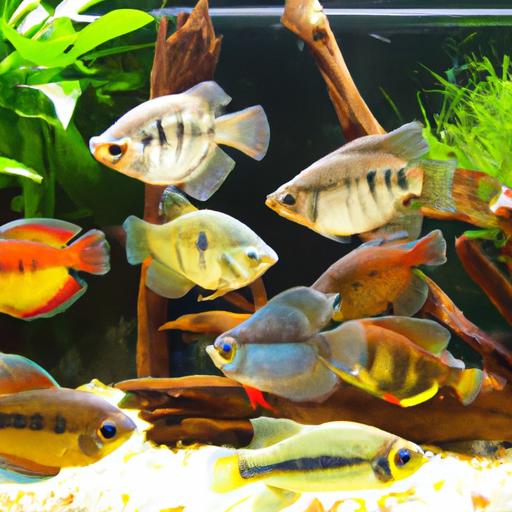
Spotlight on Freshwater Catfish Care
Discover essential tips and insights for providing optimal care to freshwater catfish in this comprehensive article. Spotlight on Freshwater Catfish Care.
Introduction
Are you a proud owner of freshwater catfish or considering getting one as a pet? Proper care for these fascinating creatures is essential to ensure their well-being and longevity. In this article, we will delve into the world of freshwater catfish care, providing you with valuable insights and tips to create a thriving environment for your aquatic companions.

Understanding Freshwater Catfish Care
Freshwater catfish, known for their unique characteristics and behavior, require specific care to thrive in captivity. Let’s explore the key aspects of providing a suitable habitat for these amazing creatures.
Tank Setup and Equipment
When setting up a tank for freshwater catfish, it’s important to mimic their natural habitat. A spacious tank with plenty of hiding spots, such as caves or driftwood, is essential. Aim for a minimum tank size of 30 gallons to accommodate their active nature.
In terms of equipment, a reliable filtration system is crucial to maintain water quality. Catfish produce more waste compared to other fish species, so a powerful filter will help keep the water clean and prevent ammonia buildup. Additionally, choose a substrate that mimics their natural environment, such as sand or fine gravel.
Water Quality and Maintenance
Maintaining optimal water quality is vital for the health of your freshwater catfish. Keep a close eye on temperature, pH levels, and ammonia, nitrite, and nitrate levels. The ideal temperature range for most freshwater catfish is between 75-80°F (24-27°C), while a pH level around 6.5-7.5 is suitable.
Regular water changes are essential to remove accumulated toxins and maintain stability. Aim for weekly water changes of around 25%, ensuring the new water is properly conditioned and matched in temperature.
Feeding Habits and Diet
Freshwater catfish are omnivorous creatures with a hearty appetite. Provide a balanced diet consisting of high-quality catfish pellets or flakes as a staple. Supplement their diet with live or frozen foods like bloodworms, brine shrimp, or daphnia to fulfill their protein requirements.
Feed your catfish in small portions, 2-3 times a day. Monitor their feeding habits and adjust the quantity accordingly to avoid overfeeding, which can lead to obesity and other health issues.
FAQ about Freshwater Catfish Care
Are you curious about the specifics of caring for freshwater catfish? Let’s address some common questions to help you navigate the world of catfish care.
What are the ideal tank conditions for freshwater catfish?
Freshwater catfish thrive in a tank with a temperature range of 75-80°F (24-27°C) and a pH level between 6.5-7.5. Provide them with ample hiding spots and a substrate that mimics their natural habitat. Regular water changes and a powerful filtration system are essential to maintain optimal water quality.
How often should I feed my freshwater catfish?
Feed your freshwater catfish small portions 2-3 times a day. Monitor their feeding habits and adjust the quantity accordingly. Overfeeding can lead to obesity and health issues, so it’s important to strike a balance.
Can freshwater catfish live with other fish species?
Freshwater catfish can coexist with other peaceful fish species that share similar water parameters. However, be cautious when selecting tank mates, as catfish may be territorial or may prey on smaller fish. Research compatibility and choose species that will peacefully cohabitate with your catfish.
What are the common health issues and how to prevent/treat them?
Freshwater catfish are generally hardy, but they can still encounter health issues. Common ailments include fungal or bacterial infections, parasitic infestations, and stress-related conditions. To prevent these issues, maintain optimal water quality, provide a balanced diet, and minimize stress factors. If you notice any signs of illness, consult a veterinarian experienced in fish care for proper diagnosis and treatment.
How can I tell if my freshwater catfish is stressed or sick?
Stressed or sick catfish may exhibit various symptoms, such as loss of appetite, lethargy, abnormal swimming behavior, changes in coloration, or visible signs of infection. Monitor their behavior closely and address any changes promptly. Maintaining a stress-free environment and providing optimal care will reduce the risk of illness.
Conclusion
Spotlighting the care of freshwater catfish has emphasized the importance of creating a suitable environment for these captivating aquatic creatures. By understanding their specific needs, such as tank setup, water quality, and feeding habits, you can ensure their well-being and enjoy their company for years to come. Remember to maintain optimal conditions, provide a balanced diet, and promptly address any health concerns. With proper care, your freshwater catfish will thrive and bring joy to your aquarium.





























